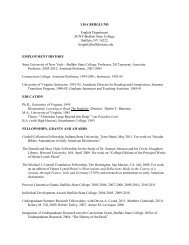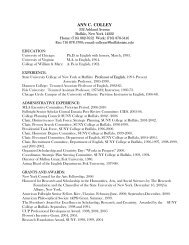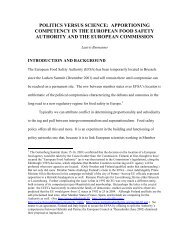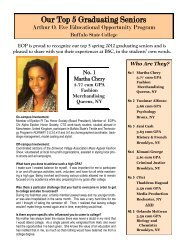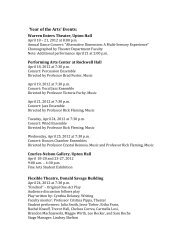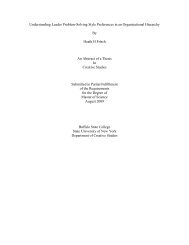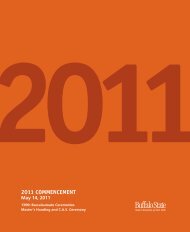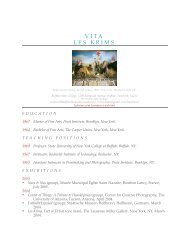Arts - Buffalo State College
Arts - Buffalo State College
Arts - Buffalo State College
You also want an ePaper? Increase the reach of your titles
YUMPU automatically turns print PDFs into web optimized ePapers that Google loves.
Business and Fashion &<br />
Textile Technology<br />
Are You Supercharged?<br />
Nicole Aversa, FTT 450W: Issues in Apparel and Textile Industry<br />
Faculty Mentor: Professor Lynn Boorady, Technology<br />
This research examined the different technologies and<br />
advancements in the cotton industry. This includes new technologies<br />
such as “Super Charged” cotton that was developed by Cotton<br />
Incorporated and first implemented by Under Armour Inc. This<br />
cotton has moisture wicking properties than previously could only<br />
be found in garments made from manufactured fibers. The advent<br />
of this and other innovations have revolutionized the sportswear<br />
industry we know today. New clothing now makes it possible for<br />
athletes to achieve more with less effort and without harming their<br />
bodies. New polymer fibers are starting to change not only the<br />
sportswear industry but also physical jobs such as firemen and<br />
policemen in apparel items such as bulletproof vests.<br />
Presentation Type and Session: Poster II<br />
“Bale” Out: Cotton Prices Are Rising!<br />
Courtney Kiff, FTT 450W: Issues in Apparel and Textile Industry<br />
Faculty Mentor: Professor Lynn Boorady, Technology<br />
Cotton is a major component in the textile industry but if cotton<br />
prices became excessively expensive, would you still buy products<br />
made from this fiber? This research looks at the recent explosion<br />
of cotton prices and its effect on consumers. Cotton prices have hit<br />
an all-time high in the past year and some consumers may debate<br />
if their comfy cotton t-shirts are worth the extra dollar or two. Due<br />
to agricultural issues, the production of cotton has decreased while<br />
the demand is increasing. Cotton, which historically has been a<br />
reasonably priced fiber, currently has become more expensive when<br />
compared to other fibers. Textile markets and company brands<br />
have been effected and forced to make the decision to either not<br />
buy cotton products or to purchase less. Today, consumers are<br />
more environmentally friendly so they prefer to buy cotton more<br />
than any other fiber. Products that contain more cotton will also<br />
increase in price that turns off the consumers from making the<br />
purchase. How much can the price increase before consumers<br />
start looking elsewhere? This issue has the potential to damage<br />
cotton manufacturers in the future if consumers become used to<br />
purchasing other fibers.<br />
Presentation Type and Session: Poster IV<br />
Breathe Easy, Save Money: Sustainability<br />
In the Clubhouse<br />
Alex Davis, Karen Coughlin, and Makayla Bidell, HTR 375:<br />
Events Management<br />
Faculty Mentor: Professor Kathleen O’Brien, Hospitality and<br />
Tourism<br />
The Club Managers Association of America (CMAA) is a<br />
professional association for managers of private clubs. The <strong>Buffalo</strong><br />
<strong>State</strong> Chapter of CMAA attended the 2012 World Conference<br />
& Club Business Expo in New Orleans, February 23-27. The<br />
chapter submitted an award-winning project for the “Club of the<br />
Future: Sustainability”, a student competition. The project was an<br />
exploration in sources of energy that could help reduce costs for<br />
private clubs and ultimately promote sustainable means of club<br />
operations. The project focused on the construction of a sustainable<br />
clubhouse in the next ten to fifteen years. Private clubs are second<br />
homes to many club members. A member spends afternoons and<br />
evenings at clubhouses that require a tremendous amount of energy<br />
and water use. Many clubs have beautiful lush golf courses that<br />
necessitate massive amounts of water for irrigation. To combat the<br />
high cost of water and reduce water waste, a creative, futuristic<br />
clubhouse design was drafted. The design features a rainwater<br />
recycling system alongside a solar water-heating unit. The outcome<br />
is a cost effective and energy efficient way to generate water for a<br />
club. In order to reduce the energy consumption of fossil fuels, windturbine<br />
technology is engineered to harvest wind energy through<br />
the use of small wind turbines. These renovations to the private<br />
clubs would reduce costs and ultimately fulfill the need for more<br />
sustainable energy.<br />
Presentation Type and Session: Poster II<br />
Certification Proclamation: The Story of<br />
Certified Organic Cotton<br />
Jessica Jaroszewski, FTT 450W: Issues in Apparel and Textile<br />
Industry<br />
Faculty Mentor: Professor Lynn Boorady, Technology<br />
The ability to make a change due to the products consumers<br />
buy and use every day makes the power of the consumer stronger<br />
today than it has ever been. As consumers become more and more<br />
eco-aware, the trend towards products that do less harm to the<br />
environment and create a better future for the world are becoming<br />
more available and more popular globally. Certified organic cotton<br />
is quickly becoming more common; tags and labels are popping up<br />
on clothing, household goods and everywhere in between touting<br />
“organic cotton” but what does the certification truly mean? My<br />
poster chronicles and contrasts globally how cotton becomes certified<br />
as organic, what the certification means and whether or not the<br />
quality standards are upheld to be the same across the board using<br />
scholarly research sources, the global input of the internet and the<br />
media’s perspective on the topic.<br />
Presentation Type and Session: Poster II<br />
41




